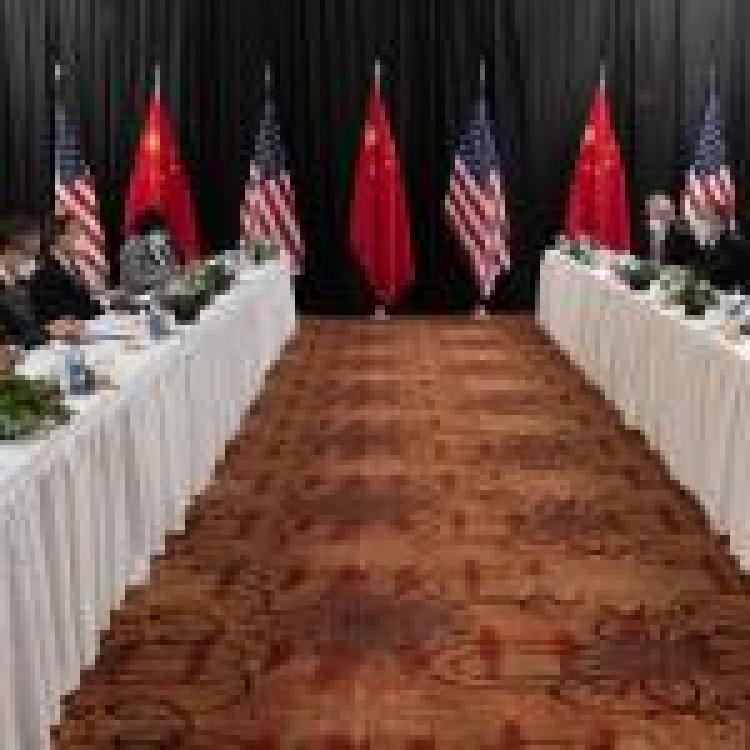![]()
Writing in the Diplomat, Madura Rasaratnam and Mario Arulthas, maintain that the current policy of appeasement, and of soft-pedalling on demands for "accountability and political reform", adopted by the US and India "comes with considerable costs and uncertain gains".
Instead of attempts to outbid China, they argue that it is necessary to use "soft" leverage to "give Sinhala leaders a reality check and push for measures that are crucial to securing stability and preventing conflict recurrence".
"The United States and India do have tools at their disposal that can be used to advance strategic ties without trading off advances on accountability and political reform," they write.
China and Sri Lanka
In their piece, the authors note growing concern over China's increased presence within Sri Lanka and what this would mean for the region. The authors highlight growing Chinese investment in infrastructure projects, financial aid, and growing Chinese tourism. However, they also note that despite Sri Lanka's pivot towards, " China has also not offered to simply bail Sri Lanka out of its current debt crisis".
This suggests "that whatever the long-term objectives, for the time being, Sri Lanka remains primarily important to Beijing as a site for excess Chinese capital and infrastructure capacity" they note.
In explaining Colombo's close ties to Beijing, the authors highlight that whilst the US and India were instruments to Sri Lanka's military victory against Tamil separatists, "Sinhala leaders always resented international insistence on a political solution to the ethnic conflict". This would lead them, mid-200s onwards, to turn to "China as an alternative source of financial and military assistance to push back on U.S. and Indian influence".
Rebuking the argument that the US and India must redouble their efforts to appease Sri Lanka, the authors question what such a policy would look like.
"To really outdo China’s offer, the United States and India will have to more than soft-pedal criticism on these issues; they will have to actively support Sri Lanka in its efforts to crack down on Tamil civil society on the island and in the diaspora. The U.S. and other Western states will be asked, as they have already been, to criminalize and proscribe Tamil diaspora advocacy, censor Tamil political expression, and share information that could be used to intimidate family members on the island. India will have to abandon its earlier recognition, through the Indo-Lanka accord, of a historic Tamil speaking presence on the island" they note.
This appeasement of Sinhala nationalist sentiment, they note, "will only fuel Sinhala leaders’ somewhat delusional belief that they can leverage the island’s strategic position to incite a cold-war style bidding war between the U.S., India, and China that will not only secure Sinhala Buddhist political domination over the minorities but also the financial resources to sustain this".
They further stress that it is "impossible for any of these international actors to provide the type of blank check financial and political backing that Colombo seeks". The writers also criticise the pursuit of closer economic and military ties with Sri Lanka "in the absence of any progress on accountability or political reform" stating this only encourages "Sinhala leaders’ belief that strategic concerns are primary and that a bidding war is possible".
In light of this, Madura and Arulthas maintain that "the principal obstacle to U.S. and Indian interests on the island is not China per se but rather Sinhala Buddhist nationalism itself and the political as well as economic outcomes it seeks".
The goal of Sinhala Buddhist nationalists
Commenting on Sinhala Buddhist nationalism, the authors highlight that Sri Lanka's primary focus "remains on securing Sinhala dominance over the Tamils and increasingly also the Muslims".
"This explains its otherwise puzzling insistence on using scarce financial resources to maintain a vast military presence in the Tamil speaking areas. Its extensive surveillance infrastructure also remains trained on monitoring and harassing Tamil civil society activists on the island and in the increasingly politically active and assertive diaspora scattered across Western states" they write.
They further add that despite a decade passing since the end of the armed conflict "the country remains mired in an escalating debt crisis, made worse by the pandemic, persistent ethnic tensions that sometimes turn violent, and creeping militarization already at acute proportions in the Tamil areas".
The source of this instability is not China, they write, "but rather the powerful and intolerant Sinhala Buddhist nationalism that dominates Sri Lanka’s politics and public institutions". Since the election of accused war criminal Gotabaya Rajapaksa to the Presidency, these forces have run unchecked.
A new direction
The authors encourage the US and India to chart a new path, highlighting that whilst Sri Lanka remains to China "merely a site of extraction or recycling excess capital ", for the US and India, Sri Lanka "has to be a long-term partner in new regional and international architectures".
They encourage an approach that utilises soft power pressure which has been fashioned through the shared history of the island to the West and India, as well as targetted sanctions.
"The English language, cricket, Hollywood, Bollywood, as well as the Tamil music and film industry all have deep cultural and social imprints across the island and are important to even the most hard-line Sinhala nationalist politicians," they write.
The piece details that members of the ruling Rajapaksa family are U.S. green card holders and highlights attempts by the previous Rajapaksa administration to counter Tamil diaspora lobbying and invested in the south Indian Tamil film industry to change negative perceptions of the island.
They further add that:
"Targeted sanctions, further travel bans on officials and family members, such as those already imposed on the head of the army Shavendra Silva, and the threat of cricket and other cultural boycotts can all have a persuasive effect, especially if they are linked to concrete expectations of progress on accountability and political reform".
Read the full piece here.


